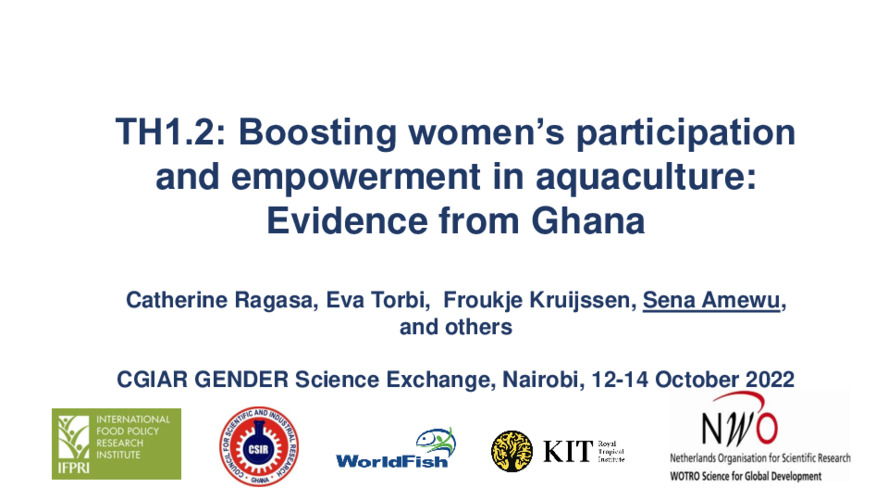Please use this identifier to cite or link to this item:
https://hdl.handle.net/20.500.12348/5518
Boosting women’s participation and empowerment in aquaculture: Evidence from Ghana
| dc.creator | Ragasa, C. | en_US |
| dc.creator | Torbi, E. | en_US |
| dc.creator | Kruijssen, F. | en_US |
| dc.creator | Amewu, S. | en_US |
| dc.date.accessioned | 2023-06-10T09:36:26Z | |
| dc.date.available | 2023-06-10T09:36:26Z | |
| dc.date.issued | 2022 | en_US |
| dc.identifier.citation | Catherine Ragasa, Eva Torbi, Froukje Kruijssen, Sena Amewu. (14/10/2022). Boosting women’s participation and empowerment in aquaculture: Evidence from Ghana. Kenya: CGIAR Gender Platform. | en_US |
| dc.identifier.uri | https://hdl.handle.net/20.500.12348/5518 | |
| dc.description.abstract | This paper provides empirical evidence on the processes and strategies of encouraging women's entrepreneurship and the impact of women's entrepreneurship on their empowerment in the context of emerging aquaculture value chains in Sub-Saharan Africa. We do this by analyzing two survey rounds with 500 fish-producing household, A-WEAI, 11 in-depth interviews, and 7 FGDs of women in six major producing regions in Ghana. Baseline data show that 9% of fish farm managers/owners were women; and women contributed 16% of labor days. Gender norms persist around aquaculture as men's job; only few women entered aquaculture. Once women entered aquaculture, they were at least as productive and profitable as men on average. Women aqua-entrepreneurs were at least as empowered as the men aqua-entrepreneurs. Being able to break the popular perspective and gender norm that "aquaculture is a men's job" and still started and operated aquafarms, these women were empowered to begin with. Their engagement in aquaculture had benefited them and empowered them more. The majority of the spouses of men aqua-entrepreneurs were not involved in aquaculture, and had lower empowerment score and were less likely to be empowered than the women and men aqua-entrepreneurs. Most of them indicated that they would like to get involved in aquaculture as it will generate more income. We discuss in this paper opportunities and strategies to involve more women in fish-producing households and to encourage new female farmers to enter aquaculture and other aspects of the value chains. | en_US |
| dc.format | en_US | |
| dc.language | en | en_US |
| dc.publisher | CGIAR Gender Platform | en_US |
| dc.rights | CC-BY-NC-4.0 | en_US |
| dc.subject | gender equality, youth and social inclusion | en_US |
| dc.title | Boosting women’s participation and empowerment in aquaculture: Evidence from Ghana | en_US |
| dc.type | Presentation | en_US |
| cg.coverage.country | Ghana | en_US |
| cg.coverage.region | Western Africa | en_US |
| cg.subject.agrovoc | agriculture | en_US |
| cg.subject.agrovoc | gender | en_US |
| cg.subject.agrovoc | gender equality | en_US |
| cg.contributor.affiliation | International Food Policy Research Institute | en_US |
| cg.contributor.affiliation | University of Ghana | en_US |
| cg.contributor.affiliation | Royal Tropical Institute | en_US |
| cg.contributor.affiliation | WorldFish | en_US |
| cg.contributor.affiliation | CSIR Water Research Institute | en_US |
| cg.contributor.affiliation | Netherlands Organisation for Scientific Research | en_US |
| cg.identifier.status | Open access | en_US |
| cg.contribution.worldfishauthor | Kruijssen, F. | en_US |
| cg.description.theme | Gender | en_US |
| cg.identifier.url | https://cgspace.cgiar.org/handle/10568/125633 | en_US |
| cg.creator.id | Froukje Kruijssen: 0000-0002-9804-3038 | en_US |
Files in this item
This item appears in the following Collection(s)
-
Gender [323]
